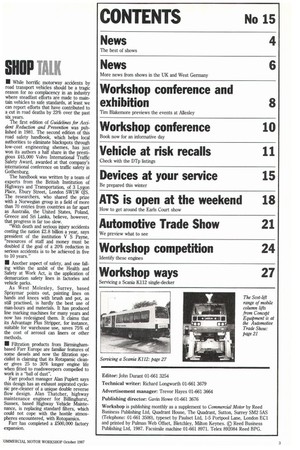SHOP TALK
Page 97

If you've noticed an error in this article please click here to report it so we can fix it.
• While horrific motorway accidents by road transport vehicles should be a tragic reason for no complacency in an industry where steadfast efforts are made to maintain vehicles to safe standards, at least we can report efforts that have contributed to a cut in road deaths by 23% over the past six years.
The first edition of Guidelines for Accident Reduction and Prevention was published in 1981. The second edition of this road safety handbook, which helps local authorities to eliminate blackspots through low-cost engineering shemes, has just won its authors a half share in the prestigious 245,000 Volvo International Traffic Safety Award, awarded at that company's international conference on traffic safety in Gothenburg.
The handbook was written by a team of experts from the British Institution of Highways and Transportation, of 3 Lygon Place, Ebury Street, London SW1W OJS. The researchers, who shared the prize with a Norwegian group in a field of more than 70 entries from countries as far apart as Australia, the United States, Poland, Greece and Sri Lanka, believe, however, that progress is far too slow.
"With death and serious injury accidents costing the nation £2.8 billion a year, says president of the institution V S Payne, "resources of staff and money must be doubled if the goal of a 20% reduction in serious accidents is to be achieved in five to 10 years."
• Another aspect of safety, and one falling within the ambit of the Health and Safety at Work Act, is the application of demarcation safety lines in factories and vehicle parks.
As West Molesley, Surrey, based Spraymar points out, painting lines on hands and knees with brush and pot, as still practised, is hardly the best use of man-hours and materials. It has produced line marking machines for many years and now has redesigned them. It claims that its Advantage Plus Stripper, for instance, suitable for warehouse use, saves 75% of the cost of aerosol can liners or other methods.
▪ Filtration products from Birmingham based Farr Europe are familiar features of some diesels and now the filtration specialist is claiming that its Rotapamic cleaner gives 25 to 30% longer engine life when fitted to roadsweepers compelled to work in a "ball of dust".
Farr product manager Alan Puplett says this design has an exhaust aspirated cyclonic pre-cleaner of a unique double reverse flow design. Alan Thatcher, highway maintenance engineer for Billinghurst, Sussex, based Highway Vehicle Maintenance, is replacing standard filters, which could not cope with the hostile atmospheres encountered, with Rotopamics.
Farr has completed a £500,000 factory expansion.




































































































































